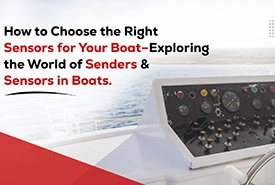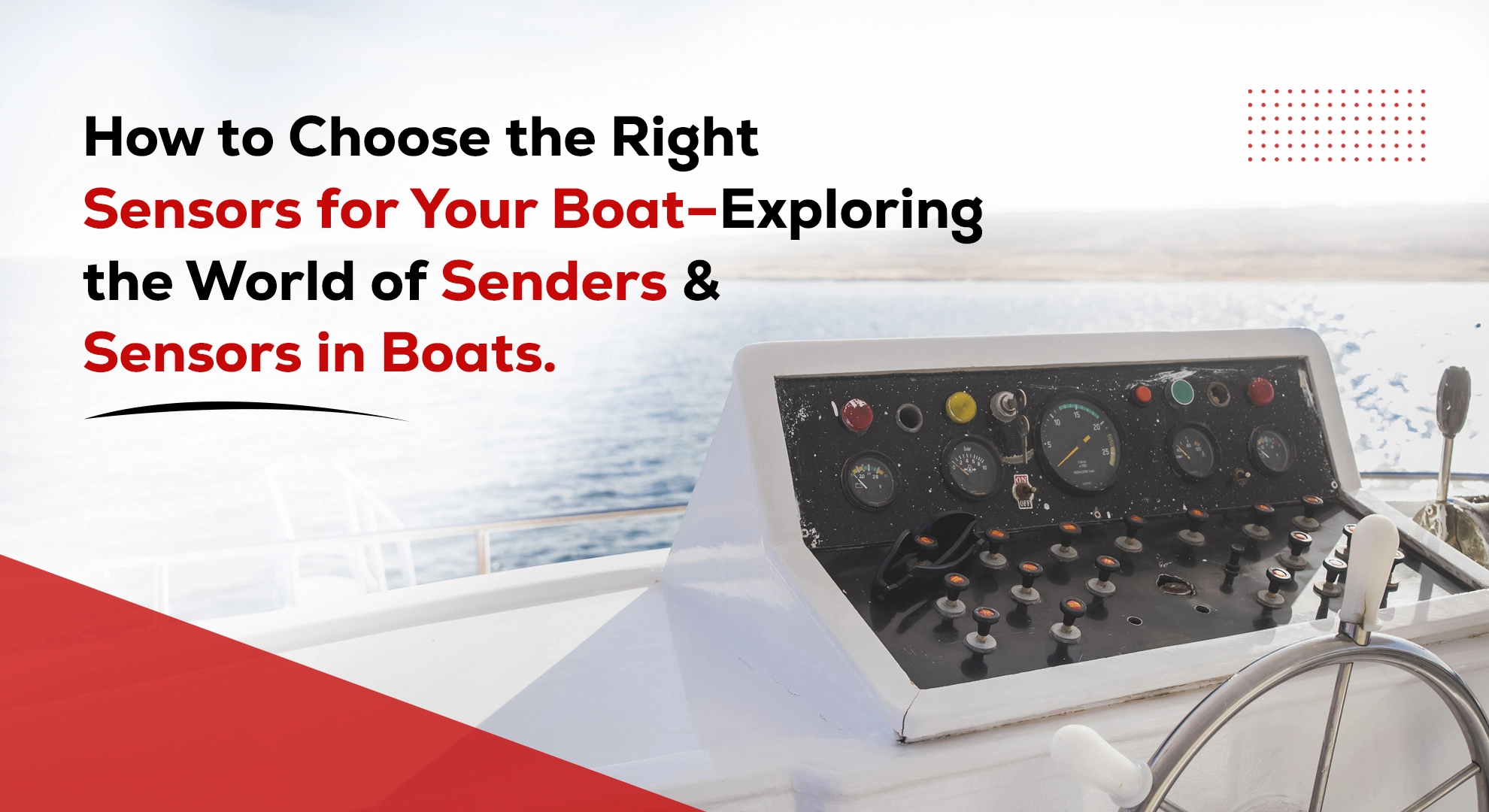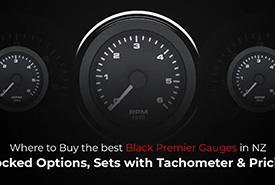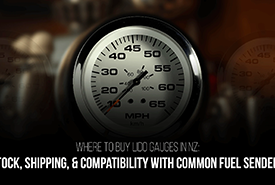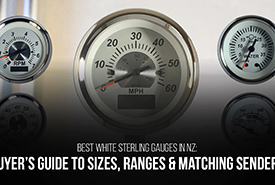- Free shipping for NZ Customers. All items are available in NZ warehouse
- +64 (0) 212576146
- [email protected]
How to Choose Right Boat Sensors for Your Boat

How Accurate Marine Gauges Can Make Your Boating Experience Safer?
September 13, 2024
How to Choose the Right Replacement Gauges for Your Equipment?
September 25, 2024How to Choose the Right Sensors for Your Boat – Exploring the World of Senders and Sensors in Boats.
When you're out on the water, your boat's performance depends on more than just the engine. One key factor that ensures a smooth and safe journey is having the right sensors on board.
Sensors keep you informed about your boat's critical systems, from engine temperature to fuel levels. But with so many different types of sensors available, how do you choose the right ones for your boat?
Let’s dive into the world of senders and sensors, and I’ll guide you through how to pick the best options for your specific boating needs.
Why Choosing the Right Sensors for Your Boat is Essential
Sensors are an integral part of your boat’s operation. They provide real-time data on essential functions like engine performance, fuel consumption, and speed. Having accurate and reliable sensors ensures that you're aware of any potential issues before they become serious problems.
Preventing Breakdowns
By continuously monitoring critical systems, sensors can alert you to issues like overheating, low oil pressure, or fuel shortages. This early warning system allows you to take action before a minor problem escalates into a costly breakdown.
Improving Safety
When you're out on the water, safety is your top priority. Sensors help ensure that your boat is running smoothly and within safe limits. For example, a temperature sensor can alert you if your engine is getting too hot, giving you the chance to shut it down and prevent damage.
Optimising Performance
Sensors don’t just prevent problems—they help you fine-tune your boat’s performance. Knowing exactly how much fuel you’re using, for example, allows you to adjust your speed or engine settings for optimal efficiency.
Types of Boat Sensors
There are several types of sensors available for boats, each designed to monitor a specific system or function. Here’s a look at some of the most common sensors and their uses:
Engine Sensors
These sensors monitor critical engine data, such as oil pressure, engine temperature, and RPM (revolutions per minute). If any of these readings fall outside of safe parameters, the sensor sends a signal to the corresponding marine gauges, allowing you to take immediate action.
Fuel Sensors
Fuel sensors measure the amount of fuel in your tank. Accurate fuel readings are essential for planning long trips and avoiding the dreaded scenario of running out of fuel in the middle of the ocean.
Temperature Sensors
Temperature sensors monitor the heat levels of your engine and other systems. Overheating can cause significant damage, so these sensors help ensure your boat operates within safe temperature ranges.
Speed Sensors
Speed sensors measure how fast your boat is moving through the water. These sensors are often used in combination with GPS systems to provide accurate speed data, which can be helpful for both navigation and fuel efficiency.
Water Pressure Sensors
These sensors monitor the pressure of water within the boat’s cooling system or other systems where water pressure is critical. Low or high pressure could indicate a blockage or leak that needs to be addressed.
How Sensors Work with Marine Gauges for Better Monitoring
Sensors and marine gauges work hand-in-hand to provide you with real-time information about your boat's performance. The sensor collects the data—such as engine temperature or fuel levels—and sends this information to the marine gauge. The gauge then translates this data into a readable format, usually through a dial or digital display, so you can understand what's happening with your boat’s systems at a glance.
Why It Matters:
- Instant Feedback: Sensors send immediate signals to gauges, which allows you to react quickly to any changes in your boat’s performance.
- Better Decision-Making: Accurate data from sensors helps you make informed decisions on the water, such as adjusting speed to conserve fuel or slowing down to prevent engine overheating.
Key Factors to Consider When Choosing Sensors for Your Boat
Choosing the right sensors for your boat can feel overwhelming, but it doesn’t have to be. Here are some important factors to consider:
Compatibility
Ensure that the sensors you choose are compatible with your boat’s existing systems, including the engine and marine gauges. Some sensors are designed to work with specific brands or models, so double-check compatibility before purchasing.
Durability
Since sensors will be exposed to harsh marine environments, they need to be durable and resistant to water, corrosion, and extreme temperatures. Look for sensors that are specifically rated for marine use.
Accuracy
Not all sensors are created equal when it comes to accuracy. For critical systems like fuel or engine monitoring, make sure to invest in high-quality sensors that provide precise data. The last thing you want is a sensor that gives you faulty readings, putting your boat and safety at risk.
Ease of Installation
Some sensors are easier to install than others. If you’re not comfortable installing the sensors yourself, consider hiring a professional to ensure they are set up correctly and integrated properly with your marine gauges.
Maintenance
Like any other part of your boat, sensors need regular maintenance to keep them functioning properly. Choose sensors that are easy to clean and calibrate, and make sure you understand the maintenance requirements before making a purchase.
Tips for Maintaining Your Sensors for Long-Term Use
Once you’ve chosen the right sensors for your boat, it’s important to keep them in good working condition. Regular maintenance not only ensures that your sensors remain accurate but also extends their lifespan, saving you from costly replacements. Here are some tips to help you maintain your boat’s sensors for the long haul:
Regular Inspections
It’s easy to forget about your boat’s sensors, but regular inspections are key to keeping them functioning properly. Make it a habit to visually inspect the sensors before and after each trip. Look for signs of wear, corrosion, or loose connections. If anything seems off, address it immediately before it causes further issues.
Keep Them Clean
Marine environments are tough on electronics, and sensors are no exception. Saltwater, dirt, and debris can build up over time, affecting a sensor’s performance. Cleaning your sensors regularly is an easy way to ensure they continue to function accurately. Use fresh water and a soft cloth to clean them and avoid using harsh chemicals that could damage the sensor’s surface.
Calibration
Like any measuring tool, sensors need to be calibrated to ensure their accuracy. Over time, sensors may start to drift, providing less accurate readings. Check your manufacturer’s guidelines for calibration intervals and have your sensors calibrated as needed to keep them working perfectly.
Protect Against Moisture
Even though most marine sensors are designed to be water-resistant, prolonged exposure to moisture can still cause damage. Try to minimise direct exposure to water by covering the sensors when they’re not in use, especially if your boat is stored outside.
Consult a Professional
If you're unsure about the condition of your sensors or if you suspect a problem, don't hesitate to consult a marine professional. They can run diagnostics and repairs that will keep your sensors working at their best. Additionally, they can help you understand the maintenance requirements specific to your boat’s make and model.
Key Benefits of Well-Maintained Sensors
Properly maintained sensors offer a range of benefits that will make your boating experience smoother and safer:
- Enhanced Reliability: Well-maintained sensors provide accurate, reliable data, giving you confidence in your boat’s performance.
- Cost Savings: By avoiding sensor failures and breakdowns, you can prevent costly repairs and replacements.
- Increased Safety: A functioning sensor system helps you monitor critical systems, reducing the risk of accidents or system failures while out on the water.
Selecting the Right Sensors for Your Specific Boating Needs
Choosing the right sensors can seem overwhelming with all the available options, but it doesn’t have to be. The key is understanding what’s important for your specific boating needs and matching the sensors accordingly. Here are some practical tips:
Consider the Type of Boat You Have
Different boats have different requirements. A small recreational boat may only need basic sensors for monitoring engine temperature, fuel, and speed. On the other hand, larger or commercial vessels may require more advanced sensors that monitor everything from water pressure to exhaust systems.
What Are Your Priorities?
Think about what systems you want to monitor most closely. For example, if fuel efficiency is a big concern, invest in high-quality fuel sensors that provide real-time data. If you’re more concerned about safety, then engine sensors and temperature sensors should be your top priority.
Budget
While it’s tempting to get the latest and greatest in sensor technology, it’s also important to stay within your budget. Identify which sensors are essential and start there. You can always upgrade or add more sensors as needed over time.
Research the Best Brands
Not all sensors are created equal, so do your homework on the brands that are known for quality and reliability in the marine industry. Look for sensors that are specifically designed for the harsh marine environment, with features like corrosion resistance and water sealing.
Get Expert Advice
If you're still unsure, it’s a good idea to consult with a marine electronics expert. They can assess your boat’s needs and help you choose sensors that are compatible with your systems and fit your boating style.
The Impact of Accurate Sensors on Boating Safety and Efficiency
Accurate sensors can make a huge difference when it comes to both safety and efficiency. By providing real-time data, sensors allow you to make quick decisions that can prevent breakdowns, optimise fuel consumption, and improve overall performance. Here’s how sensors impact boating:
Safety
Sensors act as an early warning system, alerting you to potential issues before they become major problems. For example, if your engine starts to overheat, the temperature sensor will alert you, allowing you to take action and avoid engine failure.
Efficiency
With real-time feedback on fuel usage, engine performance, and speed, sensors help you make small adjustments that can lead to big savings. You’ll be able to optimise your fuel consumption, reduce wear and tear on your engine, and keep your boat running smoothly.
Peace of Mind
Knowing that your boat is equipped with the right sensors gives you peace of mind, especially during long trips or in challenging weather conditions. You’ll have confidence that your boat’s systems are functioning properly, and you’ll be able to focus on enjoying your time on the water.
Our Verdict
Choosing the right sensors for your boat is one of the most important decisions you can make as a boat owner. From monitoring critical systems to enhancing your boat’s performance, sensors play a key role in ensuring both safety and efficiency on the water.
By selecting sensors that fit your boat’s specific needs, keeping them well-maintained, and understanding how they work with your marine gauges, you’ll be better prepared to enjoy smooth and trouble-free boating experiences.
Whether you’re a weekend sailor or a seasoned mariner, investing in high-quality sensors is a smart move that will pay off in terms of both performance and peace of mind.
With the right sensors onboard, you can confidently navigate the beautiful waters of New Zealand, knowing that your boat is in top shape and ready for whatever the sea throws your way.

